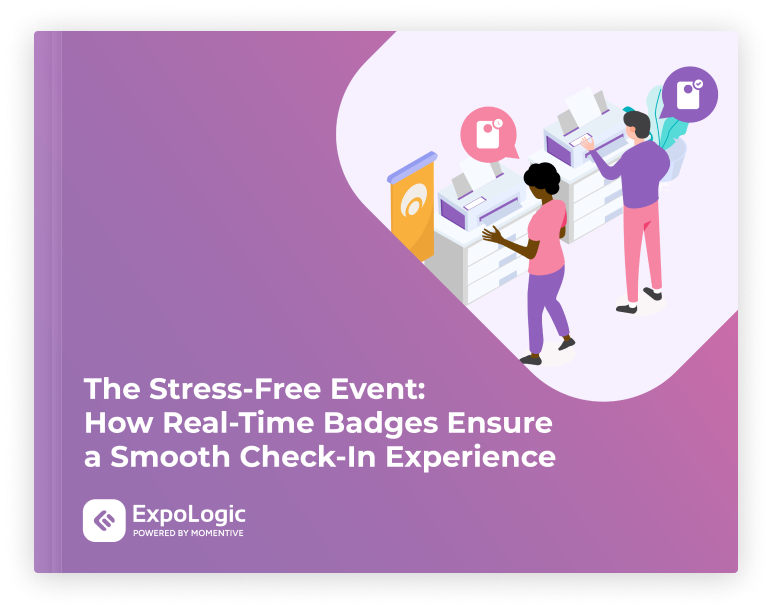Catering to the fast-paced digital age, QR code check-ins are a significant upgrade to traditional, manual registration systems. QR codes have revolutionized the event check-in process, providing event organizers and businesses with a groundbreaking solution.
Let’s explore the world of QR codes for event check-in, focusing on the benefits, and how Expo Logic’s technology solutions are at the forefront of this innovative trend.
What is a QR Check-in Code for Events?
A QR check-in code is a type of Quick Response (QR) code that simplifies and streamlines event registration for attendees, while giving greater access control to your staff.
Unlike traditional barcodes, QR codes can hold a significant amount of data, such as an attendee’s ticket information, event schedule, or personal details, making them extremely versatile for various event management functions. QR check-in codes are a modern solution tailored to streamline and digitize the check-in process, replacing manual entries and reducing wait times significantly.
When scanned, these codes can automatically update attendee lists, verify ticket authenticity, and even offer additional information like session agendas or venue maps, enhancing the overall attendee experience.
Why choose QR codes for event check-in?
DYK? Today’s global events market is projected to reach $2,046.7 billion by 2032, which translates as unique opportunities for event organizers, while underscoring the growing importance of efficient methods like QR code check-ins in managing events.
QR codes, or Quick Response codes, serve as a tech-savvy alternative to support and streamline an effective event check-in process, paving the way for seamless registration and elevated attendee experience.
Almost any event can benefit from QR code check-ins due to their inherent convenience and efficiency, but they are especially advantageous for large-scale gatherings such as conferences, music festivals, trade shows, and sporting events where handling huge crowds can be a logistical challenge.
Smaller-scale events like workshops, seminars, and networking meetups can also leverage QR code check-ins for a smoother, more professional registration process.
Here are some example situations that make QR code check-ins a game-changer:
- Large conferences and trade shows: With potentially thousands of attendees, manual registration can cause long lines and delays, not to mention the fact that events of this scale often require multiple entries and exits.
- Music festivals: Attendees often misplace or lose their paper tickets amidst the excitement and crowds.
- Workshops and seminars: These events usually involve a smaller audience, but the need for professionalism is high.
- Networking meetups: Attendees at these events are often busy networking and connecting with peers.
Expo Logic, an industry leader in the top technologies for event registration, provides an efficient and user-friendly platform for implementing QR code check-ins. Our solutions are not just a logistical tool but a strategic asset for event success.
How to use QR codes in event and conference check-in
Before we dive into the benefits of using QR codes for event check-in, let’s first understand how QR codes work. QR codes are two-dimensional barcodes you scan using a smartphone or an event ticket scanner that represents information, such as URLs or ticket numbers, in a visual, machine-readable format. When QR codes are scanned, the scanner decodes this information and takes the corresponding action.
Using the QR code from the email they received after registering for your event, an attendee holds the code up to a scanner from their smartphone or pre-printed ticket and Expo Logic’s platform then uses that QR code to verify their registration.
From an on-site tracking perspective, such as session tracking or access control to specific event areas, event organizers use the QR code on an attendee’s badge to analyze their attendee information, along with details about their experience at the event, such as session attendance and/or tickets purchased for various activities.
- Ticket verification: The most common action is verifying the user’s registration. The QR code contains the registration number or unique identifier, which, once scanned, verifies the attendee’s registration and grants them access to the event. An attendee receives their online registration confirmation and contains a QR code. At check-in, they scan their QR code, and the real-time badge printing verifies their registration and prints their badge.
- Contact details collection: QR codes can also quickly collect or confirm attendees’ contact details, which can be particularly useful for networking events where exchanging contact information is often a primary goal.
- Session registration: For events with multiple sessions, QR codes can verify access/entry into any session or special event that an attendee has registered for, which means only those who have actually registered will gain admittance.
- Lead capture: QR codes can capture leads for trade shows or business events. In this case, the exhibitor scans the QR code on the attendee’s badge, which pulls their profile information. Using Expo Logic’s lead retrieval feature, exhibitors gain access to a lead portal, from which they can download the leads scanned with their attendee information.
Implementing QR codes in event check-in processes eliminates the need for manual check-in, reducing long lines and wait times. Additionally, QR codes can provide organizers with real-time attendance numbers for the event, sessions, or special activities, which can be useful for tracking attendance and managing crowd flow.
The advantages of employing QR codes for event check-ins are manifold, which evidence why they are an increasingly popular tool in event coordination.
Streamlined and contactless check-in process
With QR codes, the check-in process becomes a swift, self-directed activity. Attendees simply present their personal QR code — typically available on their mobile device — for scanning, removing the need for handling physical tickets or interacting with staff for manual check-ins and promoting a contactless experience. QR codes expedite entry and significantly reduce potential transmission risks associated with physical contact — an essential consideration in our post-pandemic society.
Enhanced data accuracy and attendee tracking
With a QR check-in, data collection accuracy drastically improves. Since you automate the scanning process, you eliminate common event registration mistakes, like human errors often associated with manual registration, such as misspellings or incorrect data entry. You can accurately and instantly capture each attendee’s information the moment you scan their QR code ticket.
Moreover, QR codes not only record the exact time of an attendee’s arrival, but they can also track the attendee’s movement within the event. Organizers can know in real-time which sessions are popular, or which booths have the most traffic and can adjust the event’s logistics accordingly.
Improved attendee experience and reduced wait times
When an attendee only needs to scan to check in, they avoid long queues or delays at the entry point, greatly enhancing their experience. This self-service check-in process is not only convenient but also adds an element of control and autonomy to the attendee’s experience.
As mentioned above, the real-time data QR codes provide allows event organizers to manage crowd flow more effectively. If certain event areas become overcrowded, organizers can redirect attendees to less congested areas, enhancing the overall comfort and experience of the attendees.
How to Manage Event Check-in with QR Codes
Managing event check-in with QR codes involves a strategic and methodical approach to ensure a seamless entry experience for attendees. The first step is selecting a reliable technology provider with experience in QR code implementation for events of your size and complexity. Partnering with a trusted provider ensures the system is both functional and reliable.
Next, it’s crucial to define your event’s specific requirements — such as data collection preferences or customization needs — early in the planning process. This will help in tailoring the system to meet your exact expectations.
Comparing QR codes vs. traditional check-in methods
Before QR codes, traditional event check-in methods involved pre-printed tickets or physical registration lists — and while these methods were effective, they had their limitations. Let’s compare the use of QR codes for event check-in to traditional methods.
The advantages and disadvantages of traditional check-in methods
Traditional check-in methods have proven their worth over time. Physical tickets or onsite registration are straightforward and require no additional technical know-how from attendees, also providing a tangible token of event attendance, which attendees can keep as a memento or use for record-keeping purposes.
However, traditional methods also come with a fair share of drawbacks — the process can be slow and labor-intensive, leading to long queues and wait times, impacting the overall attendee experience.
There are also logistical challenges in the event of lost or misplaced tickets. Moreover, traditional methods cannot provide real-time data or insights about attendees, rendering crowd management and event optimization difficult.
Finally, using physical tickets or lists contributes to higher printing costs and poses environmental concerns. With the growing emphasis on sustainability, event organizers must look for more eco-friendly alternatives.
The advantages and disadvantages of QR codes for events
A QR code check-in system introduces a whole new level of efficiency and convenience to the event check-in process. The two-dimensional barcodes are quickly scanned using a specialized device, facilitating an almost instantaneous check-in process. This speed dramatically reduces queues and wait times, improving the attendee experience significantly.
Moreover, QR codes can provide real-time data about arrivals, departures, and overall attendance, which is invaluable for crowd management and event optimization. Being digital, they also reduce printing costs and are a more environmentally friendly approach.
However, QR codes are not without their disadvantages, requiring attendees to have a smartphone or a device capable of reading the code, which may be a barrier for some. Additionally, there’s a reliance on technology and internet connectivity with QR codes — a technical glitch or network outage could disrupt the check-in process.
Lastly, while QR codes may offer convenience and efficiency, they lack the tangibility of a physical ticket, which can sometimes detract from the overall event experience for some attendees.
QR codes are generally secure for event entry, however. Event organizers can encrypt the information encoded within a QR code, making it difficult for unauthorized individuals to decipher. Furthermore, each code can expire after a certain period or after being scanned once, reducing the risk of duplicates or fraudulent entries.
As with any technology, working with a reputable provider and implementing appropriate safeguards to protect against potential threats is crucial. Organizers and attendees should only scan codes from trusted sources to prevent potential issues.
How Do QR Codes Help Marketers Plan Events?
QR codes can significantly enhance both the marketing and planning aspects of events. From a marketing perspective, event organizers can embed QR codes in promotional materials such as flyers, emails, and social media posts, leading potential attendees directly to the event registration page or providing access to exclusive content, thereby boosting engagement and ticket sales.
Additionally, QR codes can streamline the planning process by integrating seamlessly with event management platforms, offering real-time analytics on registrations and attendees’ preferences. This data allows organizers to make informed decisions about logistics, catering to participants’ interests, and optimizing session schedules.
Furthermore, QR codes facilitate easy collection of attendee feedback post-event, helping organizers gather insights for future improvements. By leveraging QR codes, events can achieve a higher level of flexibility and personalization, enhancing both the reach and effectiveness of event planning and marketing efforts.
What are Expo Logic’s QR code technology solutions?
Now that we understand how powerful a simple event QR code is, let’s get to know Expo Logic. Expo Logic offers cutting-edge technology solutions for event check-in, primarily QR code technology.
Expedite your attendee’s journey through two diverse check-in alternatives: the conventional check-in via attendee lookup or the seamless, touch-free option via a barcode scan. Our QR code for event registration services entail the following:
Onsite hardware
Event organizers don’t have to worry about transporting and installing printers on location when more pressing issues are at hand. Expo Logic delivers exactly what you require and can provide onsite assistance for your check-in requirements. While our hardware is user-friendly and easy to set up, help is available onsite to assist with any concerns and ensure a smooth check-in process.
Database compatibility
Expo Logic seamlessly merges with other registration vendors, embracing a broad range of CRM and AMS databases for maximum adaptability. Organizers can gain peace of mind knowing they can conveniently utilize registration information for instant badge printing onsite.
Badge options
You can customize your badges according to your event’s theme or branding, providing a professional and cohesive look. And from your event management system, AMS, or CRM, you can swiftly generate superior quality, full-color badges. Our extensive badge selection comprises plastic, poly, and direct thermal badges, all available through our Badge[On]Demand service.
Real-time, actionable insights
As attendees check in with QR codes, the system updates the data in real-time, providing an immediate, accurate overview of the event’s attendance at any moment. This real-time data can be beneficial for making on-the-spot decisions or adjustments.
For instance, if the data shows that a certain session is overbooked, you can react immediately by arranging additional seating or scheduling a repeat session.
Setting up QR code check-in
Implementing an event check-in QR code system is simple with the right technology provider. Here are some key steps to take:
Step 1: Choose the right technology provider
The first step is to select a technology provider that offers QR code check-in services. Ensure the provider possesses a proven track record in handling events like yours in size and complexity. Expo Logic, for example, has worked on various events, from small workshops to large-scale conferences, and has case studies demonstrating our expertise to cater to your event’s needs. When you work with a trusted technology partner, you can rest assured that your QR code system is in capable hands.
Step 2: Define your requirements
Work with your chosen technology provider to determine the features and customizations you need for your event, ensuring that the final product meets your expectations and requirements. Defining your requirements early on will save time and prevent any misunderstandings in the future.
Step 3: Set up hardware and software
The effective implementation of a QR code check-in system at your event requires hardware and software components.
- Hardware: You’ll need devices that can read QR codes, typically dedicated scanners. The number of devices you’ll require depends on the size of your event.
- Software: You’ll require a software solution to generate unique QR codes for each attendee and corresponding software program to read these codes and check attendees in. The scanning software should also be capable of real-time synchronization, allowing instant updates for event planners.
Step 4: Test the system
Before the event, conduct thorough testing of the QR code scanning process. This step will help you troubleshoot any potential issues and ensure a smooth check-in process on the event day. You can do a mock event check-in with a small group of volunteers to ensure everything works as intended.
Ensure you adequately train your staff to handle the QR code scanning devices and assist attendees if needed.
Contactless event check-in and badge printing with Expo Logic
QR code event check-in systems are efficient and reliable ways to streamline onsite check-in and increase attendee satisfaction. With Expo Logic’s advanced technology and expertise in event management solutions, you can seamlessly integrate QR code scanning into your event planning process.



